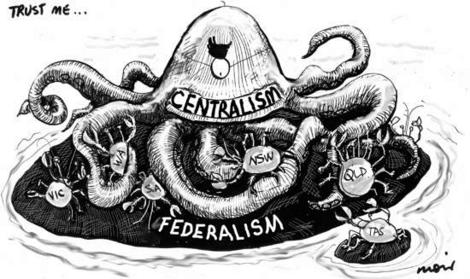|
May 12, 2006
As we know the Commonwealth Government's legislative attempt totakover industrial relations, now before the High Court. This is the result of the challenge by all the states and territories to the Commonwealth's Workchoices legislation.
I haven't been following the legal action in the High Court, and the commentary in the broadsheet press has been sparse. They mostly report tha the case presented by the states is poorly co-ordinated and unconvincing.

Alan Moir
Moir's stark view holds that a Commonwealth victory will permanently change the constitutional and political face of the nation. Australia will go from being a federation in which power is legally divided between two sets of governments, to one in which the constitutional balance of power is set daily in Canberra and the states operate as branch offices of the Federal Government.
Greg Craven, writing in The Age, spells out what is at issue: this is a battle to the death over whether Canberra owns the constitution itself.
He says:
The reason for this is simple, if not widely understood. The point of the present case is not really control of industrial relations, which merely is a convenient (and important) field of battle. Rather, at the heart of the dispute lies the Commonwealth's trading corporations power. This is being deployed by the Howard Government as the sledgehammer with which to break the lock of the constitution that has for so long denied Canberra untrammelled power.The potential of the corporation power here lies in the fact that Australia is a heavily corporatised society: corporations do everything from produce our newspapers to mind our children. If the Commonwealth can control everything about them, it can control most aspects of our lives.
Craven says that so far, Canberra's problem has been that the core of its power is not simply over "corporations", but "trading corporations".
The logic of this suggests that Capital Hill can control activities inseparable from a corporation's trade, but not essentially distinct spheres of activity. On this basis, for example, industrial relations would be out, as employment is not the "trade" of a corporation, at least outside the slave pen.But in the present case, the Commonwealth is assaulting this position with waves of tanks and Queens counsels. Stripped down, its brutally elegant position is that the corporations power allows it to control anything done by, to or around a trading corporation.
Craven says that the fundamental thing to appreciate about the triumph of such a position is that the collapse of their industrial relations systems is going to be the least of the problems of the states. In constitutional terms, the Commonwealth will possess less a corporations power than a corporations missile, capable of reaching and pulverising the strongest and most remote bastions of state power--education, health, social issues, transport, etc.
He adds that though the Commonwealth claims that it has no further territorial ambitions after industrial relations, the reality is that Canberra is pondering the spoils of its likely victory in the industrial relations case as a burglar drools over an opening safe.
He concludes:
To many, who always have seen the states as mere collectivities of inefficiency, the response will be one of indifference. They should think long and hard. If our constitution rests on a single proposition, it is that power is to be divided because total power is dangerous. Welcome to the world of total power.Ironically, perhaps the greatest long-term casualty of this debate will be Australian liberalism, the political philosophy that has heroically upheld the idea of the division of power - and the federalism based on it - in the face of repeated assaults by Labor and its allies.
Ironically it is Labor who is now defending federalism and opposing centralism.
|

Since Gorton Canberra has had the view that it makes policy, funds that policy and the states are nothing more than a beuracratic mechanism to disburse those funds in support of those policies.
Last election, all major and minor federal parties were for dissolving the states and having a British system of national government and councils.
The states are just as culpable, they havent defended their turf. Add to that Lionel Murphy style High Court that adds a piston to federal power every few years and the states are going ot have to rebel en-masse to get back to a federal system.